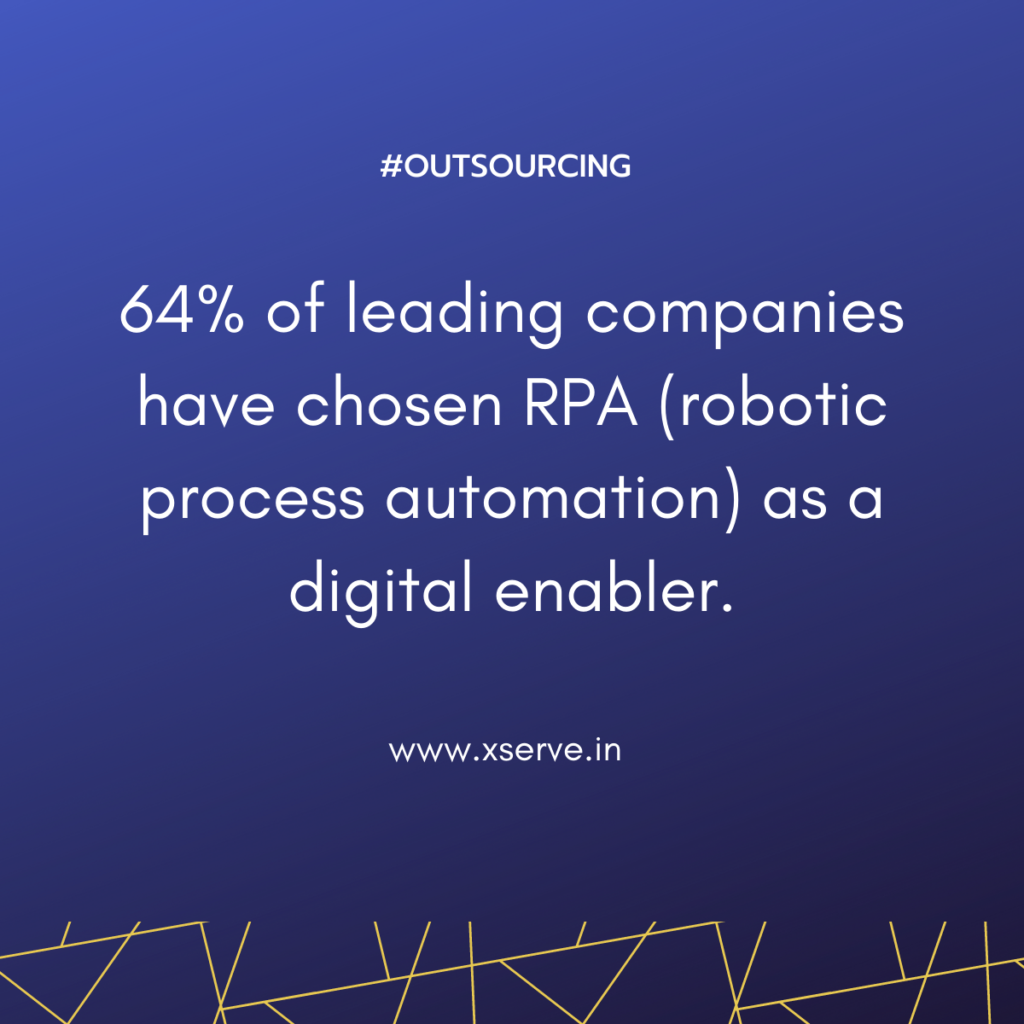Let us look at some common definitions to understand the meaning of outsourcing.
- Wikipedia defines outsourcing as an “agreement in which one company hires another company to be responsible for a planned or existing activity that is or could be done internally”
- Investopedia defines outsourcing as “the business practice of hiring a party outside a company to perform services or create goods that were traditionally performed in-house by the company’s own employees and staff”
- The Cambridge dictionary describes outsourcing as “the process of paying to have part of a company’s work done by another company”
All the three definitions give a clear overview of what is outsourcing. Outsourcing is when a company lets another entity (a business or an individual) perform one of its business functions that was or could have been handled internally. This applies to both performing services or manufacturing products.
The Origin of Outsourcing
Outsourcing started being recognized as a formal business strategy in the early 1990s. However, the practice of hiring another business to perform certain business functions started in the 1970s and gained prevalence throughout the 1980s. The primary motive was to reduce internal costs and be more competitive.
The term “Outsourcing” is believed to have been coined no later than 1981. It comes from the phrase “outside resourcing” which explains the meaning of outsourcing – hiring of outside resources to perform a service or business function.
Why do companies outsource?
Renowned management consultant Peter Drucker said – “do what you do best and outsource the rest”. This has become the underlying philosophy for outsourcing. Along with lower costs, outsourcing enables organizations to focus on their core business processes. The non-core or support processes are outsourced to third party service providers.
Reasons to outsource
- Lower costs: companies outsource non-core business functions to reduce internal cost of operations
- Free up internal resources: by outsourcing non-core, time consuming and mundane tasks, internal resources are freed up to focus more on the core business processes
- Access to expertise not available internally: some business processes need special skills and expertise which is not easily available internally. Outsourcing is a better option compared to hiring, training and managing such resources. Outsourcing gives easy and on demand access to global knowledge base and preferred capabilities
- Access to latest technology: similar to skills, access to latest technology is another reason why companies choose to outsource some business processes.
What do companies outsource?

Call centers and BPOs are the buzz words whenever there is a mention of outsourcing. However, there is more to outsourcing than call centers. Nike raised a few eyebrow when they outsourced the manufacturing of their shoes. Nike identified that the core expertise was market research, design philosophy, branding and marketing.
Over the last couple of decades, lots of other business processes have been outsourced to third party service providers.
Given below are some of the common processes that companies outsource:
- Call center services – these include inbound and outbound call center support for telemarketing, customer care, technical support, new customer onboarding
- Data entry and processing – these services are commonly referred to as back office processes. These include data entry, data conversion, e-publishing, data cleaning and processing
- Transcription services – Service providers transcribe audio files into text. Medical and Legal industries have extensively used services of outsourced transcription service providers
- Finance and Accounting – these help companies get rid of mundane and tiresome accounting tasks and gives them access to trained manpower. The services include accounting, bookkeeping, payroll services, financial reporting, tax preparation, accounts receivable and payable services
- Research and Analysis – these fall under the Knowledge Process Outsourcing (KPO) umbrella. Companies need access to market and competition data to stay flexible and adapt to the fast changing business environment. This is a skilled job and outsourcing gives companies access to experienced professionals. The services include financial research, market research and business analytics services
- Marketing – this is another function that needs specific skills and resources including manpower and technology. Digital media has changed the face of marketing and has provided a level playing field to smaller companies. From content development, search engine optimization, planning and research to campaign management, most companies rely on outsourced agencies for their marketing requirements
- Human resource outsourcing – These include services related to hiring, employee onboarding, training, payroll and employee benefits management
This is a rather small list as the outsourcing umbrella seems to be getting bigger and bigger. Companies are more than willing to outsource the more complex processes such as engineering functions, design processes and manufacturing to capable outsourcing service providers.
The growing number of business processes has increased the demand for BPOs among organizations. This has significantly increased the number of BPOs that offer support for various operations such as manufacturing, finance, marketing, distribution and information systems, and design.
Many organizations are increasingly outsourcing various business processes such as procurement, logistics, and customer support to minimize operational costs and improve business efficiency. It also helps organizations increase their market share, expand their customer base, and enhance customer relationships. According to estimates, BPO services can yield between 30%-50% cost savings for a company.
Recent trends in outsourcing
The business process outsourcing industry was hit hard by the Covid-19 pandemic. The industry saw a double digit decline in managed services in the second quarter of the last financial year, with total spending down 16%. However, the pandemic turned out to be an unexpected catalyst for rapid digitization and transformation of the traditional BPO model. The industry quickly shifted beyond brick-and-mortar facilities to one focused on business flexibility and agility with work-at-home arrangements.
The global business process outsourcing market is expected to grow by USD 76.90 billion during 2020-2024. The impact of the Covid-19 pandemic forced companies to once again focus on reducing operational costs. This would be one of the key drivers for the expected growth.
Emerging Trends
- Companies to step up digitization
- Work from home to be a widely used and popular solution
- Remote working will pose data security threats
- Higher spending in training and development programs
Digital Transformation in Outsourcing
Companies would step up digitization to create a more modern business environment with tighter regulations and compliances. We expect a greater emphasis on process automation. BPO service providers need to invest in robotic process automation (RPA) to keep up with the cost demands of business process outsourcers. RPA uses bots and artificial intelligence on a user interface to complete work faster, at a cheaper rate.
The global RPA market size was estimated to be $1.57 Billion in 2020. This is expected to grow at a CAGR of 32.8% from 2021 to 2028.

Work from Home Outsourcing Solutions
Work from home will continue to be a widely used and popular solution. The immediate need to switch to a work from home model at the outbreak of Covid-19 changes business processes in a very short time. This included the adoption of “home office” solutions. Contrary to popular perception, more and more companies have welcomed “work from home” as the job efficiency and productivity concerns associated with it substantially proved to be false.
- BPOs migrated 52% agents to a work from home model during the pandemic
- 46% agents would prefer to work full time at home
- 52% agents would prefer to have some blend between the office and home
Data Security Threat
As per a CISCO study, nearly 6% of employees admitted to transferring files between work and personal computers when working from home. This puts a company’s data at risk and could potentially create significant loss. BPOs need to ensure robust internal IT support and information security policies to monitor and control remote workforce. Clients would subject BPOs to harsh data security requirements. BPOs would be accountable to detect non-compliant objects and people in the remote environment.
Training and Development
There will be higher spending in training and development programs. When remote working, the physical distance between agents and supervisors will make performance monitoring and coaching difficult. This could affect performance, job satisfaction and continuous improvement. Companies would need to invest in online and innovative recruitment, monitoring, training and retention strategies.
Planning to Outsource?
Outsourcing and offshoring key business processes have their benefits in terms of cost savings, higher productivity and access to specialized services. Partnering with the right service provider is a critical step to ensure outsourcing objectives are realized. Talk to us to set up your outsourcing roadmap.


Thanks so much for the article post.Really looking forward to read more.